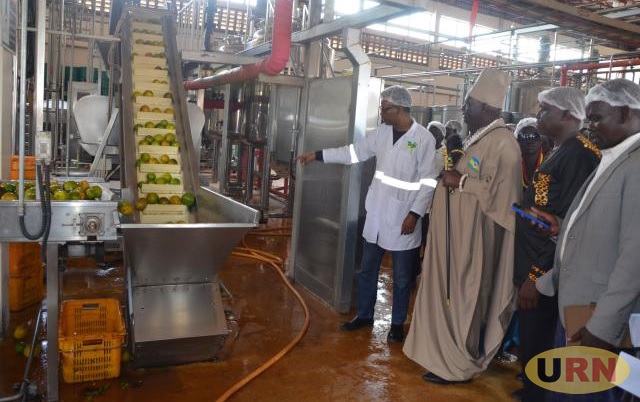
Soroti, Uganda | THE INDEPENDENT | The Soroti Fruit Processing Factory is undergoing a major revival under its new management, igniting hope and excitement among local leaders and farmers in the Teso sub-region. The Iteso Paramount Chief, Emorimor Paul Sande Emolot, expressed optimism during his first official visit to the factory since operations were handed over to Chimaki Agro Limited in June 2025.
The factory, once beset by operational challenges, is now undergoing expansion and modernization. Jorem Opian Obicho, a board member representing the Teso Tropical Fruit Growers Cooperative Union (TEFCU), revealed that a second processing line has been installed—resolving the long-standing issue of alternating between mangoes and oranges on a single line. “This is a significant improvement. It means efficiency and better service to farmers,” he said.
The facility has acquired an additional five acres of land to support its expansion, and plans are underway to procure an automated packaging machine expected to begin operations within a month. The management has also partnered with SOCADIDO to map orange and mango trees across more than 3,000 villages in the region.
Opian said Chimaki Agro Limited is taking a holistic approach by offering training to farmers on pest and disease control and helping to revive primary cooperative societies. Residues from fruit processing will now be used to produce fertilizers and animal feeds. “We’re also planning a benchmarking tour for selected farmers to a foreign country to improve local practices,” he added.
In a notable development, the factory has resumed use of locally grown mangoes and started exporting orange concentrate and mango pulp to countries such as Tanzania after receiving international certification. “Machine maintenance has improved, a borehole has been repaired, and power management systems have been fixed,” Opian noted. “Farmers are now paid more promptly, and we’ve increased fruit purchases to about 1.5 million kilograms this season, with a target of 3 million in the first season.”
The factory has also introduced tamarind juice and encouraged diversification into pineapples, passion fruit, and other crops for future processing. Plans are in motion to dry fruits for export and produce germ for bread-making. Despite improved government funding, which has risen from less than Shs100 million to about Shs160 million, Opian appealed for further support.
He urged Emorimor to lobby government to invest more in disease and pest control, noting that nearly 40% of fruits rot due to such challenges. “Just as the government supports coffee in other regions, we too need subsidies and pesticides to help our fruit farmers,” he emphasized. Farmer trainer Robert Ogala from Serere District also appealed to the Iteso cultural leader to advocate for small-scale irrigation systems to counter drought-related losses. He noted that many farmers continue to lose fruit trees during dry spells, despite citrus fruits being the region’s top cash crop since cotton lost relevance.
Ogala also suggested a cultural nudge: “Let it be mandatory to serve Teju juice at all public functions. That will promote our own product.” He encouraged peer learning among farmers to raise production quality and factory supply. John Omugur, spokesperson for the NRM Entrepreneurship League in Teso, warned that unresolved pest and disease problems have forced some farmers to cut down fruit trees.
Azeb Mesfin Haile, Director of Chimaki Agro Ltd, shared her ambitious plans to triple the factory’s capacity. “We are committed to transforming this place and keeping the Teju brand strong—Teju water, Teju passion fruit, Teju tamarind, and Teju ginger,” she said. “Be proud of your product. Drink your product.” She emphasized President Yoweri Museveni’s strong interest in the factory’s success and noted that challenges such as fungal infections and pesticide shortages are on the president’s radar.
In his remarks, Emorimor Emolot acknowledged the frustration that had led many farmers to abandon citrus farming, but praised the new management for restoring hope. He promised to mobilize the Iteso community to resume fruit cultivation to support the growing facility. “This factory has brought hope for wealth creation and improvement in the lives of our people,” Emorimor said. “There is now more money circulating among farmers in Teso.”
Representatives from TEFCU and the NRM Entrepreneurship League attended the event, adding their voices to the call for sustained government support. The Soroti Fruit Factory was initiated by President Museveni in 2014 and officially commissioned in April 2019. It was built to provide a reliable market for oranges and mangoes and reduce post-harvest losses. The government, through Uganda Development Corporation (UDC), owns 80% of the factory’s shares, while TEFCU owns 20%. Located in Arapai Industrial Park, Soroti City East Division, the factory can process six metric tonnes of fruit per hour into puree, concentrate, and natural ready-to-drink juice under the Teju brand. The Teso sub-region remains Uganda’s leading citrus producer, and the revitalization of the fruit factory signals a promising future for both the local economy and the farmers who depend on it.
****
URN
 The Independent Uganda: You get the Truth we Pay the Price
The Independent Uganda: You get the Truth we Pay the Price



